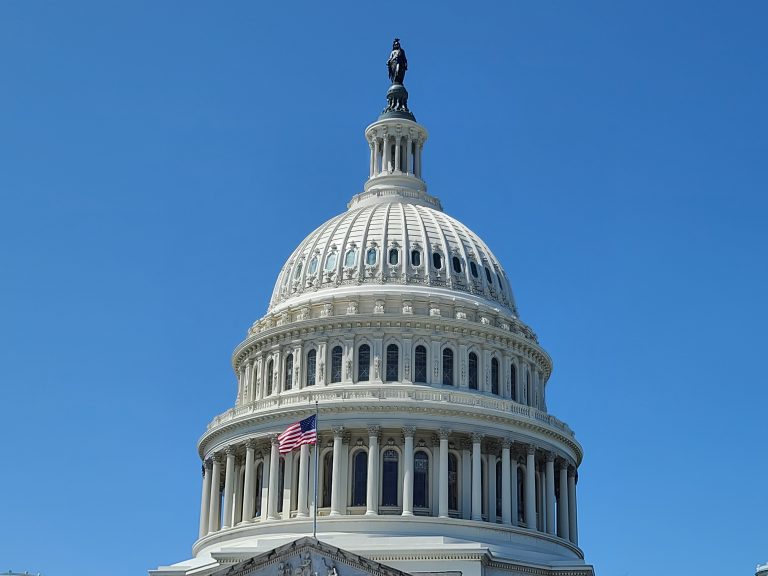An effort by Senate Democrats to quickly ban bump stocks in the wake of a Supreme Court decision striking down the ATF’s administrative ban failed on Tuesday.
A vote on unanimous consent to disregard normal rules and move the Banning Unlawful Machinegun Parts (BUMP) Act forward was unsuccessful after Senator Pete Ricketts (R., Neb.) objected to the bill. The measure, introduced by Senator Martin Heinrich (D., N.M.) last June, would ban the sale and possession of bump stocks and all other devices that “materially increase the rate of fire of a firearm.”
“By undoing the commonsense ban on deadly bump stocks, the MAGA Supreme Court has shown how dangerously far right they will go. It risks public safety, tragedies, American lives,” Majority Leader Chuck Schumer (D., N.Y.) announced on social media.
The vote marks the first political response to the Supreme Court’s decision last week to invalidate former President Donald Trump’s administrative ban on bump stocks. In a 6-3 ruling, the High Court found that the ATF lacked the authority to ban the controversial devices unilaterally but left the door open for Congress to act on the issue.
Now, the ban bill faces an uphill battle to become law before the 2024 election. Schumer elected to advance the BUMP Act under unanimous consent, meaning a lone dissenting Senator was able to derail the effort. It also let Senators facing tough re-election campaigns in 2024 avoid a recorded vote on the new gun restriction.
Only one Republican, Senator Susan Collins of Maine, signed on as a co-sponsor of Heinrich’s bump stock legislation.
“Bump stocks are designed to turn semi-automatic firearms into what are essentially machine guns,” Collins said in a statement. “This bipartisan legislation will prohibit the use of these dangerous devices while protecting the Second Amendment rights of law-abiding Americans.”
Senator Mitt Romney (R., Utah) also expressed support for the measure. However, multiple Republicans have opposed it, including Senators Lindsey Graham (R., S.C.) and J.D. Vance (R., Ohio).
“I’ll stick with the court decision,” Graham told reporters Monday. “I want to keep it like it is.”
That dims its long-term viability as backers try to find a path forward after the failed unanimous consent vote.
The bill likely faces further headwinds from gun-rights supporters because of its broad definitions for banned weapons and accessories. Ostensibly aimed at bump stocks, the bill would also prohibit the sale, transfer, and possession of any semi-automatic firearm that has been modified “in any way” that “materially increases the rate of fire,” potentially subjecting basic trigger modifications to the same restrictions as machinegun conversion devices. Current owners of semi-automatics deemed modified would only be allowed to keep them if they registered them with the federal government under the National Firearms Act of 1934.
Gun-rights groups quickly began mobilizing against the BUMP Act following Schumer’s announcement of a vote. Gun Owners of America called it a “fake bump stock ban,” while the National Association for Gun Rights cautioned its followers that the bill would leave gun owners vulnerable to capricious ATF enforcement.
“This overly broad ‘definition’ will operate similar to ATF’s latest ‘engaged in business’ rule,” the group said. “Meaning that ATF will be able to dictate on whim what they deem ‘increases the rate of fire.'”
The challenge of crafting a targeted definition for banning bump stocks has plagued past legislative efforts. Concerns over an overly broad ban prompted Democratic Governor Janet Mills of Maine to veto a state-level effort in May. It was likely one of the driving forces behind the Trump administration’s decision to pursue a ban by executive order in 2018, even as Congress was actively considering a ban of its own with some bipartisan interest.
Still, Senate Democrats hope that the Supreme Court’s revival of public interest in the ban will renew enough public pressure for Republicans and moderate Democrats to overcome any objections to the bill’s language.
“Republicans were supportive of banning bump stocks when the Trump administration took this step after the shooting in Las Vegas—the deadliest in American history,” Schumer said. “They should support it when I bring the bill to the Senate floor.”
After Senator Ricketts objected to the BUMP Act’s unanimous consent request, effectively ending the push to expedite its passage, Senator Heinrich promised to continue pushing for the ban.
“This will not be the last time you hear about these devices on the floor of the Senat,” Heinrich said.







2 Responses
I think it’s past time to recast the discussion. The only reason bump stocks were even created is to provide a means to simulate (poorly) the capability that was unconstitutionally restricted by prohibiting civilian possession of automatic weapons manufactured since 1986. Were there restrictions on civilian possession of any sort of firearms when the Second Amendment was ratified? No, Biden’s misstatements about cannon notwithstanding. The automatic weapon ban was presaged by the 1934 National Firearms Act. Even its proponents recognized that a ban would be unconstitutional, so they enacted a tax. At the time, the tax was oppressive and could more than double the cost of owning those firearms. I’d argue that tax also has no precedent contemporary to ratification, especially at that level and with concurrent registration, but I’d be interested in seeing the historical data.
On the other hand, expecting SCOTUS change 90 years of historical firearms law is folly. That isn’t where the changes should be made in any case. It’s the job of Congress to change those laws, and it’s the job of voters to ensure their representatives and senators understand and will fulfill that responsibility. It’s also voters’ responsibility to ensure the President will sign that legislation when it goes to the White House. Neither of the current leading candidates seem likely to meet that standard.
It won’t happen in the next election, but it will never happen if we don’t start making it a priority in selecting elected officials.
I think those are all very good points. I also don’t see SCOTUS or either party getting rid of the NFA. But that doesn’t mean it couldn’t become a reality down the line if enough voters want it.